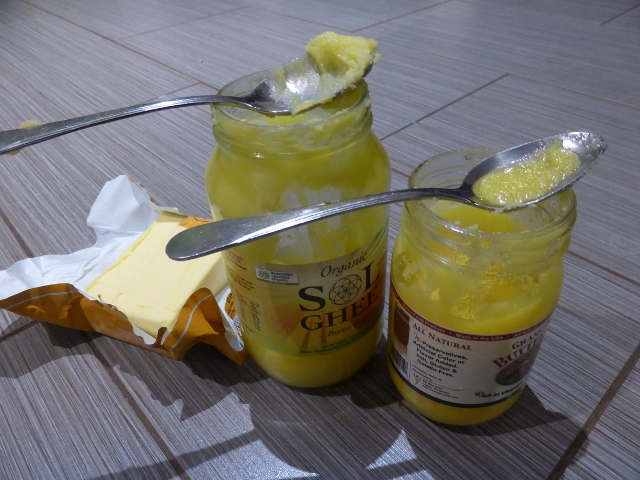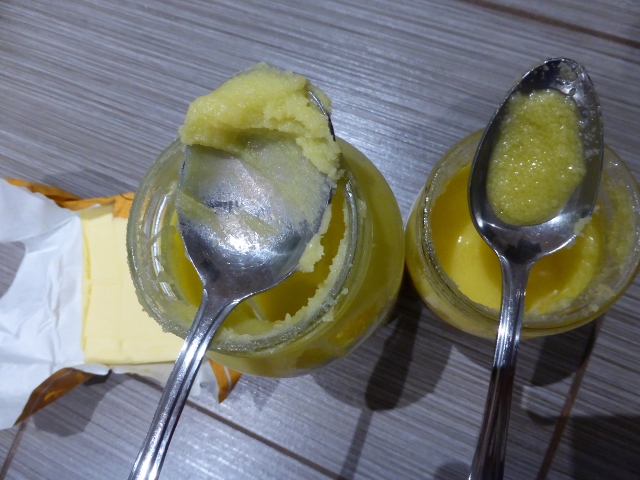Butter, ghee, butter oil... does the difference really matter?
Jul 13, 2016

The main difference is in the way they are made. Butter is made from whipping the cream and separating the fat (in Australia it will be pasteurised unless you make it yourself from raw cream). Cultured butter is made from sourcream (and is especially delicious in my opinion). Ghee is made from heating the butter at low temperature and pouring off the milk solids so that only the butter fat remains - so generally an easy form of dairy to digest. And butter oil is made by extracting the fat/oil at low temperature using a centrifuge to preserve nutrients.
Each one of these foods are beautiful, nutrient dense and a great addition to a healthy diet for you and your family.
Grass fed is the most important factor in determining nutrient level in any of these products, and Dr. Weston A Price found that the diet of the cows had a great influence on the nutrient quality of the end product. So above all else seek out grass pastured products.
It then depends on your purpose and on your budget. If you are in good health then it will be great to include as much of the best butter and ghee that you can afford, preferably from cows grazing on rapidly growing green grass. The fats in these will help your body detoxify, and ghee can actually be used to flush toxins from the body in the form of a ghee flush.
If you are trying to heal specific problems, for example, tooth decay then the investment in butter oil is well worth it. You take smaller amounts and take it as a supplement. In combination with cod liver oil the benefits for overall health, including healing teeth, can be wonderful. This protocol of cod liver oil and high vitamin butter oil is based on the work of Dr Weston A Price in healing tooth decay.
To give you an idea of the differences between the three, have a look at this visible difference between organic grass fed butter on the left, organic grass fed ghee in the middle and non-organic grass fed butter oil on the right. The butter oil is definitely more yellow, richer in appearance and in flavour. And the butter is the palest of the three.

In our family we use all three. We regularly cook with ghee and appreciate that it doesn't burn easily and is still nutritious even at higher temperatures. Butter is used liberally in cooking as well, at lower temperatures, or stirred into food when cooking is complete. And butter oil is taken as a supplement during times when we seem to need a health boost or when we are focusing on healing a specific issue, and in our house it's always paired with fermented cod liver oil. Sometimes for convenience and variety we use readymade cod liver oil and butter oil blend.
Butter or ghee are also lovingly mixed with raw honey to taste and set in the fridge in little balls - these are great for stabilising blood sugar, providing a little energy boost, and the enzymes in the honey help with digestion. They are especially good in the early stages of the GAPS Diet or for a healthy, calming treat for children.
But back to you and your budget - if you are on a tight budget I recommend prioritising butter and ghee as regular foods. If you have serious health issues or tooth decay, butter oil and cod liver oil are great... but if the budget doesn't stretch that far I would rather see you take cod liver oil and include butter and ghee in your diet and skip the butter oil. You could also consider an affordable supplement of extra virgin cold pressed coconut oil to go with the cod liver oil. High doses of coconut oil can help your body better absorb the cod liver oil. So on a budget it could be paired with cod liver oil... decisions, decisions, decisions... whatever you choose your body will just love the nutrients and will use it as best it is able to heal and nourish you.
I hope you're inspired to enjoy all three in your diet, and appreciate the different processes and benefits of each.
Disclaimer
The information, including but not limited to text, graphics, images, and other material contained on this website are for informational purposes only. This website is not intended to be a substitute for professional medical, healthcare or educational advice, diagnosis, or treatment. Always seek the advice of a qualified healthcare provider for any questions you may have regarding you or your child’s health concerns, and never disregard professional medical advice or delay in seeking it because of something you have read on this website.
blog comments powered by Disqus
